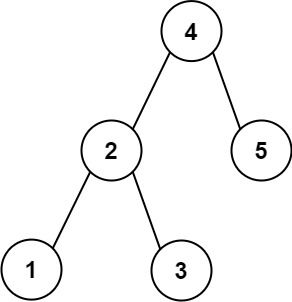Given the root of a binary search tree, a target value, and an integer k, return the k values in the BST that are closest to the target. You may return the answer in any order.
You are guaranteed to have only one unique set of k values in the BST that are closest to the target.
Example 1:
Input: root = [4,2,5,1,3], target = 3.714286, k = 2 Output: [4,3]
Example 2:
Input: root = [1], target = 0.000000, k = 1 Output: [1]
Constraints:
- The number of nodes in the tree is
n. 1 <= k <= n <= 104.0 <= Node.val <= 109-109 <= target <= 109
Follow up: Assume that the BST is balanced. Could you solve it in less than O(n) runtime (where n = total nodes)?
